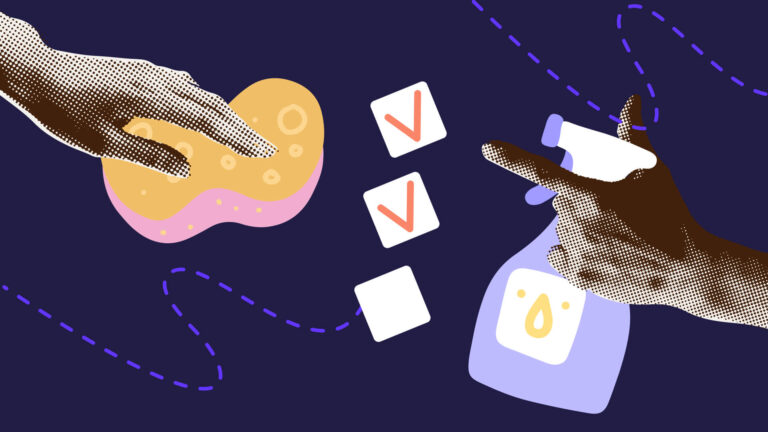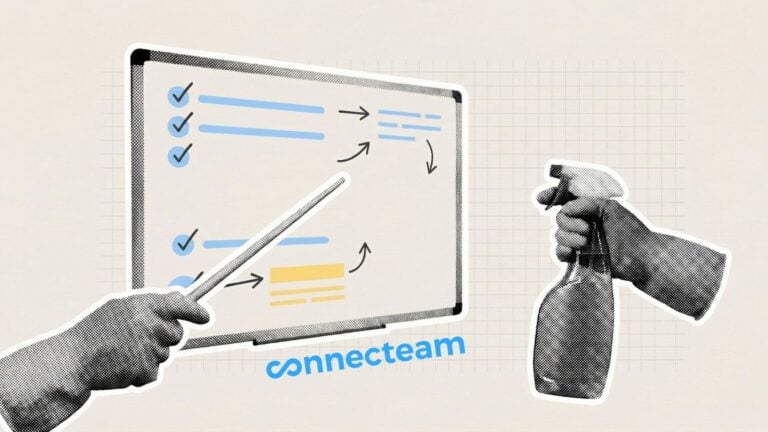Running a professional cleaning business requires in-depth market knowledge to ensure your offering competitive pricing. In this article, we’re going over everything you need to know to understand how much to charge your clients and ensure your earn a profit.
Key Takeaways
- There are multiple ways to charge your clients, including per hour, room, and by square footage.
- Factors affecting house cleaning prices include labor costs, size of the space, cleaning supplies, overhead costs, taxes, and markup.
- Besides charging for labor, you’ll need to factor in additional fees like: taxes, overhead, and cleaning supplies.
If you own or manage a professional cleaning company or are just starting a cleaning business, it’s crucial to stay up to date with market standards to ensure you’re offering competitive cleaning rates while also covering your costs.
In this article, we’ll explore various factors that can influence average costs of cleaning services and help you determine the best pricing strategy for your business.
Factors Affecting How much to charge for cleaning services
Several factors come into play when determining how much to charge your clients for house cleaning services and other types of cleaning services. These include:
- Size of the house or space: Larger houses typically require more time and effort to clean, resulting in a higher cost.
- Number of bedrooms and bathrooms: The more bedrooms and bathrooms a house has, the more cleaning tasks there are to tackle. This can affect the overall price, as more rooms and bathrooms may require additional time and resources.
- Type of cleaning: The type of cleaning required can also impact the cost. Standard cleaning, which focuses on regular maintenance tasks, may be less expensive than deep cleaning, which involves a more intensive and thorough cleaning process.
- Specific cleaning tasks: Certain cleaning tasks, such as cleaning appliances or handling special surfaces, may require additional time and specialized cleaning supplies. These tasks can contribute to the overall cost.
- Time it takes to clean: More extensive or detailed cleaning jobs will naturally take longer, resulting in a higher cost.
- Use of cleaning supplies: Some house cleaning companies may provide their own cleaning supplies, while others may require homeowners to provide them. Any additional cleaning products needed for specific tasks may also affect the overall cost.
- Overhead costs: These expenses are not directly tied to the cleaning tasks but are necessary for running a cleaning business, such as business insurance for cleaning companies, office rent, utilities, and marketing.
- Taxes and markup: Depending on where you’re located, cleaning businesses may be required to pay sales tax or other taxes on their services including permits and licenses for providing cleaning services. Markup is the percentage added to the cost of providing the service, which can help cover your profit margin.
- Other factors: Your cleaning company may charge more or less based on factors such as company reputation, experience, and location.
This Might Interest You
You can also check our free house cleaning calculator to help you estimate house cleaning services cost.
Different Types of Cleaning Services and Average Costs
Let’s go over some of the most common types of cleaning services as well as the average total cost of each:
Residential cleaning
Standard house cleaning focuses on homes and living spaces, and includes cleaning bedrooms, kitchens, bathrooms, and living areas. This type of basic house cleaning usually involves dusting, vacuuming, mopping, and cleaning surfaces.
Average cost for a standard 1,000sqft home: $230
Commercial cleaning
Commercial cleaning is intended for businesses that need cleaning services, like offices, shops, and restaurants. This involves cleaning floors, windows, workstations, and common areas to maintain a professional environment.
Average cost: $200-$400 for a small office
Carpet cleaning
This involves deep cleaning carpets, removing dirt, stains, and allergens through methods like steam cleaning or dry cleaning to refresh and extend the life of carpets.
Average cost: $181
Moving-out cleaning
Renters moving out of a leased property may hire a moving-out cleaning service to thoroughly clean the property and remove dust, dirt, grease, and grime to prepare the space for the next tenant.
Average cost: $400 for a one-bedroom, one-bathroom home
Deep cleaning
A more intensive cleaning service that covers areas often missed in regular weekly cleaning service, deep cleaning focuses on cleaning behind appliances, inside ovens, under sinks, and detailed scrubbing of all areas.
Average cost: $200-$400 for a standard home
After event cleaning
This is intended for cleaning up functions such as weddings, concerts, and conferences to ensure the venue is spotless and presentable for the next event.
Average cost: $200-$400
Construction cleaning
Construction cleaning is intended for cleaning up construction sites, including removing debris, dust, and construction waste to prepare the building for occupants or the next phase of construction.
Average cost: $200-$400
This Might Interest You
Check out our article on the the 8 best cleaning business software solutions.
Pricing Per Hour, Square Footage, and Number of Rooms
You may want to establish different pricing structures for different types of cleaning services.
In this section, we’ll be breaking down three different pricing models and when you may want to use each.
It’s important to note that these quotes don’t include tax and overhead, so it’s important to add these in when providing customers with quotes. After all, you need to make a profit to keep your business running.
For example, let’s say you’ve calculated a $200 quote to clean a new customer’s home. On the invoice, don’t forget to include:
- FICA and taxes
- Overhead costs for running your business
- Cost of supplies, if the customer isn’t providing them
Clearly list each additional cost and label the total clearly.
Pro Tip
Managing multiple jobs at once and creating schedules for your cleaning crew can be time-consuming and difficult. Simplify the process with an employee management app, like Connecteam.
Create employee schedules in seconds, assign jobs and tasks, streamline communication, and store important training and safety manuals right in the app for easy reference.
Get started with Connecteam today!
Pricing per square foot
When to use: Ideal for commercial cleaning services or large homes. Charging per square foot allows your pricing structure to more accurately reflect the size of the house or space you’re cleaning and the amount of work required.
Advantages:
- Provides a clear and straightforward way to estimate costs for large spaces.
- Easier for clients to understand and compare prices.
Pricing per square footage is determined by:
Number of square feet x cost per square foot
So, if someone asks for a quote for cleaning their 1000 square foot home and you charge a rate of 10¢ per square foot, the quote would be $100 before taxes and fees.
Pro Tip
No matter how you choose to charge your clients, consider cleaning frequency in your pricing. For example, You may want to charge slightly higher rates for one-time jobs, and less for recurring services, like weekly cleanings. Why you’ll earn less per job, it’s a steady income you can count on.
Pricing per room
This takes into account the number of rooms and bathrooms in a house. As the number of rooms increases, the price generally goes up.
When to use: Best for standard residential cleaning services where rooms are average size and in relatively good conditon. Pricing per room is also a good option for services like Airbnb cleanings or regular maintenance cleanings.
Advantages:
- Simplifies the pricing model for you and the client.
- Offers predictable pricing, making it easier for clients to budget.
- Efficient for properties with a consistent number of rooms and condition.
Keep in mind that some rooms may require more time to clean than others. For instance, cleaning a kitchen often requires more time compared to a bedroom or living room, which justifies a higher fee for kitchen cleaning tasks.
Here’s an example of how pricing per room might be structured:
Total Cost = Number of Rooms × Rate Per Room + Additional Fees
Let’s break it down:
- Number of Rooms: This is the total number of rooms that need to be cleaned.
- Rate Per Room: This is the fixed amount you charge for cleaning each room. The rate can vary based on the type of room (for example, bedroom vs. kitchen) or the level of cleaning required (such as standard cleaning vs. deep cleaning).
- Additional Fees: This could include charges for extra services that are not covered in the standard room cleaning rate. Examples might be cleaning appliances, windows, or providing special cleaning services for areas that require more intensive labor. It could also include surcharges for urgent cleaning needs or travel fees if the location is outside your standard service area.
Here’s an example calculation:
- Suppose you charge $50 per room.
- A client wants 5 rooms cleaned.
- There’s an additional fee of $30 for cleaning a large living area that requires extra work.
Using the formula:
Total Cost= 5 × 50 + 30 = $280 before taxes and fees
This formula gives you a starting point. However, it’s important to adjust your rates based on your costs, the local market, and the level of service you provide.
This Might Interest You
Check out our free checklists to guide your employees and streamline business operations:
- Spring Cleaning Checklist for Cleaning Businesses
- Cleaning Supplies Checklist
- Checklist for House Cleaners
Pricing per hour
When to use: This structure is suitable for jobs where the scope is not clearly defined, for first-time cleanings, or for deep cleaning services. It’s also beneficial when the condition of the premises varies significantly from one job to another.
Advantages:
- Flexibility to accommodate various job sizes and conditions.
- Fairness to both you and the client, as payment is for actual work completed.
- Easier to quote and manage expectations for diverse cleaning tasks.
In the US, the average hourly rate for cleaning companies in 2024 ranges from $25 to $75 per cleaner. You may want to just include additional fees, like taxes and overhead, into your hourly wage to keep things simple for the customer.
Did You Know?
In the US, the average hourly rate for cleaning companies in 2024 ranges from $25 to $75 per cleaner.
Read more on how much to pay your cleaner and the best payroll software for small cleaning companies.
Keep in mind that you can charge more for extra tasks that aren’t normally included in your standard professional services. Here’s a quick reference chart of average costs of cleaning add-ons:
| Cleaning Task | Charge |
| Oven cleaning | $30 |
| Refrigerator cleaning | $25 |
| Garage cleaning | $50 |
| Laundry | $10-$20/load (extra charge for folding and putting clothes away) |
| Pet hair removal | $40 |
| Window washing | $5/window |
| Outdoor patio or deck cleaning | $25 |
| Basement or attic cleaning | $50-75, depending on how much work is required |
FAQ
How much should I charge for cleaning services?
The cost of cleaning services varies depending on factors such as the size of the house or area, the type of cleaning required, and the local market. Consider pricing models, competitive rates, and your business expenses when determining your charges.
What factors affect professional house cleaning costs?
Several factors can influence house cleaning prices, such as the size of the house, the number of bedrooms and bathrooms, the type of cleaning required, the time it takes to clean, special requests from the client, and the cost of cleaning supplies and appliances.
Move-out cleaning services may have higher costs due to the thorough nature of the job.
How much does move-out cleaning cost?
The cost of move-out cleaning varies depending on the size of the property and the level of cleaning required. Prices can range from $220 for a 4-hour cleaning service to $440 for an 8-hour cleaning service.
Some cleaning companies may offer additional services for move-out cleaning, such as cleaning appliances or using eco-friendly cleaning supplies. Consider the specific needs of the move-out cleaning job when determining the pricing.



